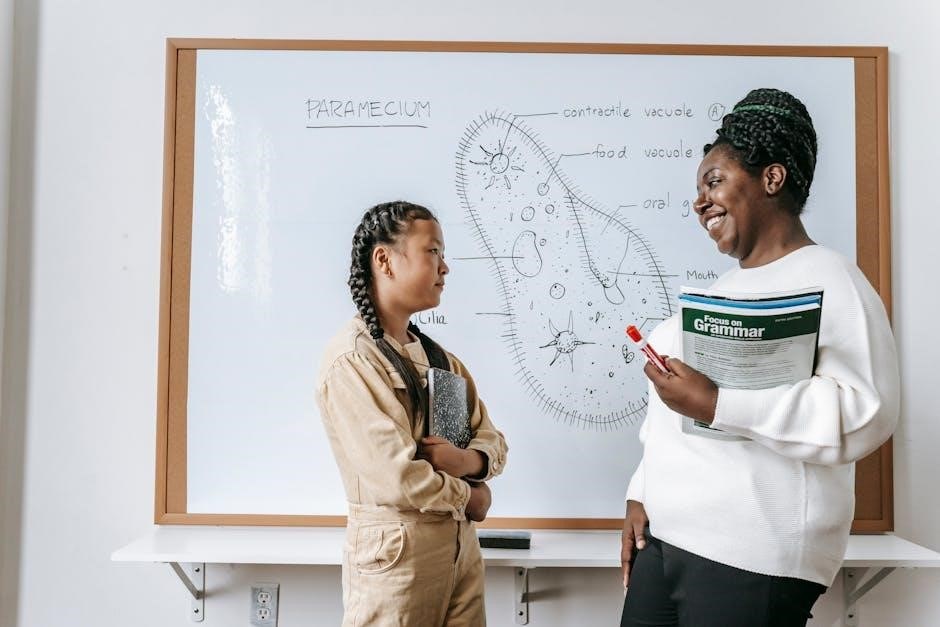Teaching in nursing blends clinical expertise with educational skills‚ preparing future nurses to deliver high-quality care. It addresses challenges‚ fosters innovation‚ and promotes evidence-based practices in healthcare education.
1.1 The Role of Nurse Educators in Modern Healthcare
Nurse educators play a pivotal role in shaping the future of healthcare by preparing skilled‚ compassionate nurses; They design curricula‚ foster clinical expertise‚ and mentor students‚ ensuring they meet professional standards. Educators also address challenges like bullying and incivility‚ while promoting collaborative learning and adaptability to evolving healthcare demands‚ ultimately enhancing patient care and outcomes;
1.2 Key Challenges and Opportunities for Nursing Faculty
Nursing faculty face challenges such as addressing bullying and incivility‚ ensuring safe infrastructure‚ and identifying barriers to student success. Opportunities include fostering digital literacy‚ promoting interprofessional collaboration‚ and integrating innovative teaching strategies. These efforts enhance nursing education‚ preparing students for the evolving healthcare landscape while maintaining high standards of patient care and professional growth.

Curriculum Development in Nursing Education
Nursing education curriculum must align with professional standards‚ integrating technology and fostering critical thinking. It ensures students gain essential skills‚ addressing modern healthcare challenges effectively.
2.1 Aligning Curriculum with Professional Standards
Aligning nursing curriculum with professional standards ensures students meet essential competencies. Accreditation bodies like CCNE and ACEN provide frameworks for program development‚ focusing on evidence-based practices and patient safety.
Curriculum alignment also involves integrating regulatory requirements and staying updated with healthcare trends‚ ensuring graduates are prepared to meet industry expectations and deliver high-quality care.
2.2 Designing Competency-Based Learning Objectives
Competency-based learning objectives focus on measurable skills and knowledge students must master. These objectives guide instruction and assessment‚ ensuring students can apply skills in real-world settings. They emphasize clear outcomes‚ such as performing clinical procedures or critical thinking‚ and are aligned with professional standards. Regular assessment through simulations and hands-on practice helps validate student competence.

Clinical Teaching Strategies
Clinical teaching strategies emphasize hands-on learning‚ simulation-based training‚ and real-world application of skills. These methods enhance students’ ability to apply theoretical knowledge in practical healthcare settings effectively.
3.1 Simulation-Based Learning in Nursing Education
Simulation-based learning bridges the gap between theory and practice‚ allowing students to engage in realistic clinical scenarios. This method enhances critical thinking‚ decision-making‚ and technical skills in a safe environment. By replicating real-world patient interactions‚ simulations prepare nurses for diverse clinical challenges‚ fostering confidence and competence. This approach is particularly effective for training in high-stakes procedures and emergency response.
3.2 Effective Precepting and Mentorship in Clinical Settings
Effective precepting and mentorship are vital for nursing education‚ offering personalized guidance to enhance clinical skills and confidence. Through constructive feedback and supportive interactions‚ preceptors foster professional growth‚ preparing future nurses for real-world challenges. These strategies ensure students develop the competence and critical thinking needed for successful healthcare careers.
Evaluation and Assessment in Nursing Education
Evaluation and assessment are critical in nursing education‚ ensuring students meet clinical competencies and critical thinking standards. These processes guide learning outcomes and professional preparedness effectively.
4.1 Innovative Approaches to Student Assessment
Innovative assessment methods in nursing education include simulation-based evaluations‚ adaptive learning technologies‚ and competency-based assessments. These approaches enhance traditional testing by providing real-world application and personalized feedback. Simulation-based learning allows students to practice clinical skills in controlled environments‚ while AI-driven tools tailor assessments to individual needs‚ fostering deeper understanding and critical thinking. Team-based learning (TBL) also encourages collaborative problem-solving‚ preparing students for healthcare teamwork.
4.2 Evaluating Clinical Competence and Critical Thinking
Evaluating clinical competence and critical thinking involves assessing students’ ability to apply knowledge in real-world scenarios. Simulation-based learning and case studies provide opportunities to observe problem-solving skills. Reflective journaling and peer feedback further enhance understanding of clinical decision-making. These methods ensure nurses are prepared to think critically and deliver evidence-based care in dynamic healthcare settings.

Integrating Technology in Nursing Education
Technology enhances nursing education through AI‚ machine learning‚ and adaptive learning tools. These innovations personalize education‚ improve engagement‚ and prepare students for modern healthcare challenges effectively.
5.1 Using AI and Machine Learning for Adaptive Learning
AI and machine learning revolutionize nursing education by offering adaptive learning experiences. These technologies tailor content to individual needs‚ enhancing engagement and retention. A recent study highlights their integration‚ enabling real-time feedback and personalized skill development. Adaptive platforms adjust difficulty based on student performance‚ fostering a dynamic learning environment. This approach addresses diverse learning styles‚ ensuring comprehensive preparation for clinical challenges while maintaining ethical standards in education.
5.2 Team-Based Learning (TBL) and Active Learning Strategies
Team-Based Learning (TBL) is an evidence-based‚ small-group strategy that engages students in applying knowledge. Active learning fosters critical thinking‚ collaboration‚ and problem-solving. TBL promotes accountability and immediate feedback‚ enhancing nursing education. It aligns with adaptive learning by encouraging dynamic interactions and practical application‚ preparing students for real-world clinical scenarios while maintaining ethical educational practices and promoting digital literacy for modern healthcare challenges.

Legal and Ethical Considerations for Nursing Faculty
Nursing education requires adherence to legal policies‚ ensuring infrastructure safety and addressing bullying. Faculty must maintain ethical standards‚ fostering professionalism and respect in academic settings.
6.1 Understanding Policies on Infrastructure and Safety
Understanding policies on infrastructure and safety is crucial for nursing faculty. These policies ensure safe learning environments‚ proper equipment maintenance‚ and emergency preparedness. Compliance with regulations protects students‚ staff‚ and institutions‚ fostering a secure academic setting. Faculty must stay informed about updates to these policies to uphold legal and ethical standards in education.
6.2 Addressing Bullying and Incivility in Academic Settings
Bullying and incivility in academic settings can create a hostile environment‚ affecting morale and retention. Nursing faculty must address these issues proactively by promoting respect‚ fostering open communication‚ and enforcing clear policies. Encouraging a supportive culture and providing resources for affected individuals are essential to maintaining a positive and productive learning environment for all students and staff.
Interprofessional Education and Collaboration
Interprofessional education fosters collaboration between nursing and other healthcare disciplines‚ enhancing communication and teamwork. It prepares students for real-world healthcare environments‚ improving patient outcomes through integrated care.
7.1 Fostering Collaboration Between Nursing and Other Disciplines
Fostering collaboration between nursing and other disciplines is crucial for effective healthcare delivery. Interprofessional education ensures students understand roles‚ communicate effectively‚ and work cohesively in teams. Strategies like Team-Based Learning (TBL) and active learning promote shared decision-making and mutual respect‚ preparing graduates for real-world healthcare environments where collaboration improves patient outcomes and enhances care quality.
7.2 Strategies for Effective Communication in Healthcare Teams
Effective communication in healthcare teams requires active listening‚ clear messaging‚ and structured frameworks. Strategies include regular team meetings‚ role clarification‚ and conflict resolution training. Encouraging open dialogue and fostering a culture of respect and transparency are essential. Additionally‚ addressing barriers like incivility and promoting digital literacy enhance collaboration‚ ensuring seamless information exchange and improved patient care outcomes.
Supporting Student Success in Nursing Programs
Supporting student success involves identifying barriers‚ fostering resilience‚ and promoting digital literacy. Strategies include tailored resources‚ mentorship‚ and innovative tools to enhance learning and professional growth.
8.1 Identifying Barriers to Student Success
Identifying barriers to student success involves addressing challenges such as limited clinical exposure‚ information-seeking difficulties‚ and personal issues like time management or financial stress. These obstacles can hinder academic performance and professional growth. Faculty must recognize these barriers to provide targeted support‚ ensuring students overcome them and thrive in their nursing education journey.
8.2 Promoting Digital Literacy and Information-Seeking Skills
Promoting digital literacy and information-seeking skills is essential for nursing students to navigate modern healthcare. Faculty can foster these skills through interactive modules‚ access to credible resources‚ and workshops on using digital tools. Encouraging critical evaluation of online sources and fostering lifelong learning habits prepares students for evidence-based practice and continuous professional development in a rapidly evolving healthcare landscape.

Professional Development for Nursing Faculty
Professional development for nursing faculty involves enhancing teaching skills‚ staying updated on healthcare trends‚ and accessing resources for continuous growth to improve educational outcomes and leadership.
9.1 Building Skills in Quality Improvement and Education
Building skills in quality improvement and education requires integrating evidence-based practices‚ fostering innovation‚ and enhancing leadership abilities. Nurse educators must stay updated on healthcare trends and educational methodologies to deliver effective training. Professional growth opportunities‚ such as workshops and certifications‚ help faculty refine their expertise‚ ensuring they can prepare students for real-world challenges in patient care and healthcare systems.
By focusing on continuous improvement‚ faculty can create dynamic learning environments that promote critical thinking and clinical competence. This ensures nursing education remains aligned with industry standards and prepares graduates for evolving healthcare demands.
9.2 Resources for Continuous Professional Growth
Resources for continuous professional growth include workshops‚ certifications‚ and educational tools. Nurse educators can leverage AI-driven platforms for adaptive learning and digital literacy. Collaboration with interdisciplinary teams and access to updated guides‚ like “Teaching in Nursing: A Guide for Faculty‚” provide invaluable support; These resources help faculty stay informed and enhance their teaching strategies‚ ensuring they remain effective in nurturing future nurses.

Future Trends in Nursing Education
Future trends include integrating AI‚ simulation-based learning‚ and pragmatic approaches to adapt to healthcare’s evolving landscape. These innovations aim to enhance nursing education’s effectiveness and relevance.
10.1 Embracing Pragmatic Approaches to Nursing Education
Pragmatic approaches in nursing education focus on practical‚ real-world applications‚ integrating AI and simulation-based learning to prepare students for dynamic healthcare environments. These methods address faculty-student dynamics‚ fostering collaboration and innovation while ensuring curriculum adaptability to meet future challenges effectively.
10.2 Preparing for the Evolving Landscape of Healthcare
Nursing education must adapt to emerging healthcare trends‚ integrating AI and simulation-based learning to enhance clinical readiness. Faculty development in quality improvement and fostering positive learning environments are essential. Addressing challenges like bullying and promoting interprofessional communication strategies ensure nurses are prepared to thrive in dynamic‚ collaborative healthcare settings.
